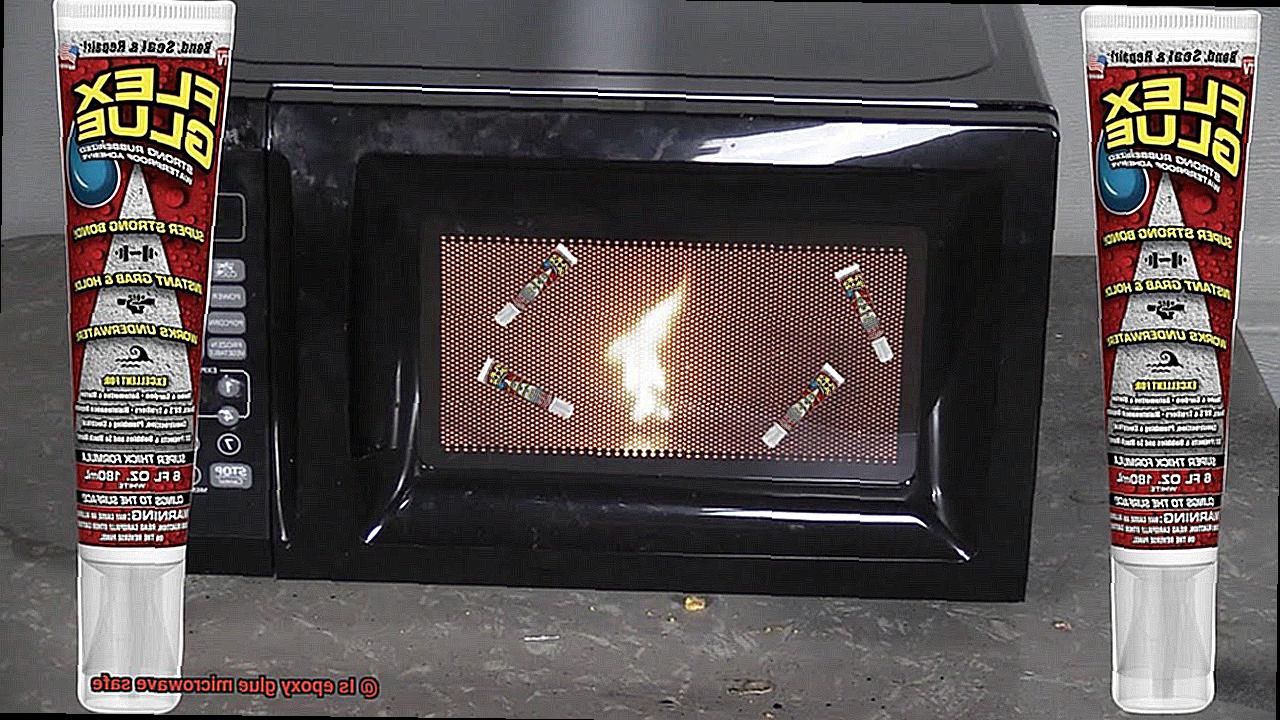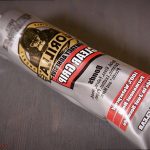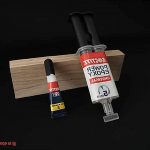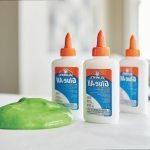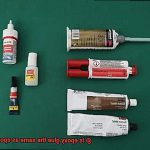Microwaves have changed the culinary game, making it easier than ever to whip up a meal in minutes. But when it comes to using certain materials with microwaves, there are some uncertainties. One of the most common questions is whether epoxy glue can be used safely in the microwave.
Epoxy glue is a popular adhesive that’s tough as nails and commonly used in DIY projects and industrial settings alike. However, with more and more products designed for microwave use hitting store shelves every day, it’s essential to know whether epoxy glue is safe for use with this kitchen appliance.
In this blog post, we’ll explore this topic inside out. We’ll take a closer look at what epoxy glue is and how it works. Plus, we’ll investigate whether or not you should feel comfortable using epoxy glue in your microwave oven. Additionally, we’ll discuss any potential risks associated with using epoxy glue in the microwave and provide tips for safe usage.
If you’re someone who loves getting crafty or enjoys microwavable meals from time to time, then keep reading. This post will answer all your burning questions about whether or not epoxy glue is safe for use with microwaves.
What is Epoxy Glue?
Contents
Epoxy glue is a remarkable adhesive that can bond a wide range of materials together. It consists of two components, a resin and a hardener, that are mixed together just before use. Upon mixing, the two components react chemically to form a robust and long-lasting bond that can withstand water, heat, chemicals, and even some types of impact.
One of the key features of epoxy glue is its versatility. It comes in various forms that can be used in different projects, including liquid adhesives, paste-like fillers, and moldable putties. This makes it ideal for use in construction, art, and crafts.
However, when it comes to using epoxy glue in the microwave, there are concerns to consider. Some epoxy glues may contain hazardous compounds that can emit harmful fumes when exposed to high temperatures. These fumes can pose a danger to your health and contaminate the food being heated in the microwave.
Therefore, it’s crucial to check the label carefully before using epoxy glue in the microwave. Look for information on heat resistance and toxicity levels and ensure that the glue is explicitly labeled as microwave-safe.
But even if the epoxy glue is deemed safe for use in the microwave, it’s still best to avoid using it whenever possible. Overheating or uneven heating can cause the glue to break down or release harmful fumes.
If you must use epoxy glue in the microwave, take necessary precautions to protect yourself. Apply only a small amount of glue, avoid heating for extended periods, and monitor it closely while heating. Furthermore, avoid inhaling any fumes that may be released during heating.
Types of Epoxy Glue
Epoxy glue is a powerful adhesive that has become a staple in the construction, manufacturing, and household industries. There are various types of epoxy glue available, each with its unique properties and uses. Here are five sub-sections that explain these different types of epoxy glue in more detail:
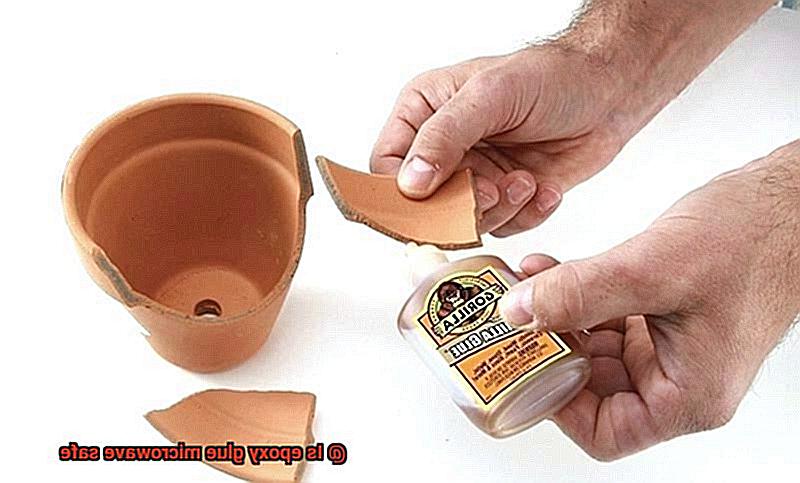
One-component epoxy glue
This type of epoxy glue is convenient to use as it comes in a single container and does not require mixing. It is perfect for small projects that require quick bonding, such as repairing a broken toy or fixing a piece of jewelry.
Two-component epoxy glue
This type of epoxy glue requires mixing two parts – the resin and the hardener – before use. The mixture hardens when exposed to air, making it ideal for large projects that require strong bonding, such as building a wooden boat or repairing metal structures.
Structural epoxy glue
This type of epoxy glue is designed to bond structural components like beams, columns, and walls. It has high strength and durability and can withstand heavy loads. Structural epoxy glue is perfect for construction projects where safety and stability are top priorities.
Clear epoxy glue
This type of epoxy glue dries clear, making it ideal for projects where appearance is important. For example, it is perfect for bonding glass or making jewelry without leaving any visible residue.
High-temperature epoxy glue
This type of epoxy glue can withstand high temperatures and is ideal for heat-resistant applications such as automotive repairs or industrial machinery.
When it comes to microwave safety, choosing an adhesive that is labeled as microwave safe is essential. Many types of epoxy glues contain metal particles or conductive materials that can cause sparking or fires when exposed to microwaves. Therefore, always read the label carefully before using any type of adhesive in the microwave.
Potential Risks of Using Epoxy Glue in the Microwave
While epoxy is a versatile adhesive that can be used for a variety of projects, it is crucial to choose a microwave-safe adhesive to avoid any hazards.
One of the primary risks of using epoxy glue in the microwave is the possibility of the adhesive breaking down or melting under high heat. This can result in a messy situation inside the microwave and potentially damage the appliance. Not only that, but if the epoxy glue is used to repair a microwave-safe item such as a dish or utensil, there is always a risk that the glue could contaminate food when heated.
Another potential risk of using epoxy glue in the microwave is the release of toxic fumes. When heated, certain types of epoxy can emit fumes that are harmful to humans, particularly if inhaled in large quantities. It is important to note that not all types of epoxy are created equal, and some might be safer than others when exposed to high temperatures.
Toxic fumes are not the only danger associated with using epoxy glue in the microwave. Using this adhesive may also void any warranties or guarantees on both the appliance and the item being repaired. Manufacturers do not recommend using adhesives or other materials not specifically designed for use in microwaves, and doing so could lead to costly repairs or even injury.
Is All Epoxy Glue Microwave Safe?
While epoxy glue is a fantastic adhesive that can bond surfaces together, not all types of epoxy glue are safe for use in the microwave. So, before you dive into your next project, let’s explore why this is and how you can safely use epoxy glue in your microwave-safe creations.
Epoxy glue consists of two parts – a resin and a hardener that when mixed together, harden and bond surfaces. However, the specific chemicals used in the resin and hardener can vary depending on the brand and type of epoxy glue. Some types of epoxy glue may contain harmful chemicals that could potentially leach into your food or beverages when heated in the microwave. Therefore, it is crucial to read labels carefully before choosing an epoxy glue for a microwave-safe project.
To ensure that your epoxy glue is safe for microwave use, it’s highly recommended to choose a brand that explicitly states its microwave safety. These types of epoxy glues have undergone testing to guarantee that they do not release harmful chemicals when exposed to microwave radiation. By doing so, you can be assured that your project is safe to use in the microwave.
But wait, there’s more. Following the manufacturer’s instructions is equally important when it comes to using epoxy glue in your microwave-safe projects. The instructions may include recommendations on how long to wait after applying the glue before using the item in the microwave or whether or not the item can be washed in a dishwasher. It’s important to follow these instructions to ensure maximum safety.
How to Check for Microwave Safety
Microwaves are a convenient and time-saving appliance that many people use daily. However, it’s crucial to ensure that the materials and products used in the microwave are safe to prevent any harm or damage. When it comes to epoxy glue, a popular adhesive used for various purposes, checking for microwave safety is essential. Here are five sub-sections of how to check for microwave safety when using epoxy glue:
Read the Label Carefully
The first step in checking for microwave safety when using epoxy glue is to read the label carefully. Look for any indications that the product is safe for use in the microwave or heat-resistant. If there is no information on the label regarding microwave safety, it’s best to assume that the product is not safe for use in the microwave.
Perform a Simple Test
If you’re unsure whether your epoxy glue is safe for use in the microwave, you can perform a simple test. Apply a small amount of epoxy glue onto a non-food item that is microwave-safe, such as a ceramic dish or glass jar. Microwave the item with the epoxy glue for a short amount of time and observe if there are any changes in the adhesive or if any fumes or odors are emitted. If there are no changes or reactions, it may be safe to use the epoxy glue in the microwave.
Avoid Prolonged Heating
Even if your epoxy glue is labeled as microwave-safe, it’s important to avoid prolonged heating. Applying only a small amount of glue and monitoring it closely while heating can prevent the glue from breaking down or releasing harmful fumes.
Use Caution When Heating Food
When using epoxy glue in the microwave, it’s important to exercise caution while heating food. Always keep food away from the area where you applied the glue to avoid any potential contamination.
Avoid Using Epoxy Glue on Food Items
Lastly, it’s crucial to note that even if an adhesive like epoxy glue is deemed safe for use in the microwave, it should only be used for non-food items. Using adhesives on materials that come into contact with food can be harmful and potentially toxic.
Tips for Safely Using Epoxy Glue in the Microwave
Microwaves can be a useful tool for curing epoxy glue quickly, but it’s important to prioritize safety when doing so. Here are five tips and precautions you should take when using epoxy glue in the microwave:
Check the label
Before using any epoxy glue in the microwave, make sure it is labeled as microwave-safe. This means that the adhesive has been tested and approved for use in high heat environments.
Apply thinly and evenly
To avoid creating hot spots in the microwave, apply a thin layer of adhesive to the surface being bonded. Thick layers of epoxy glue can trap heat and cause bubbling or breakdown of the adhesive.
Allow for full cure time
Once the adhesive has been applied, allow it to fully cure before using the item in the microwave. Not doing so could result in unforeseen reactions that may be dangerous.
Follow manufacturer instructions
Always follow the manufacturer’s instructions when using epoxy glue in the microwave. This includes ensuring proper ventilation and avoiding direct contact with skin or eyes.
Use appropriate type of epoxy glue
Different types of epoxy glue have different properties and may not be suitable for high heat environments like microwaves. Ensure that you are using an appropriate type of adhesive for your project.
It’s important to remember that epoxy glue should never be used on surfaces or materials that will come into contact with food. Additionally, always handle epoxy glue with care, wear protective gear such as gloves and eye protection, and seek medical attention immediately if any irritation or reaction occurs.
Alternatives to Using Epoxy Glue in the Microwave
Epoxy glue might not be the best choice. Although it’s known for its strength and durability, it’s not microwave safe. This means that using it to fix a mug or plate could lead to dangerous chemical reactions or even a fire.
But don’t worry – there are plenty of alternatives that are safe and effective for use in the microwave. One popular option is silicone adhesive. Not only is it flexible and waterproof, but it can also withstand high temperatures. And best of all, it’s microwave safe. So, if you’re repairing something that will be exposed to heat or moisture, silicone adhesive might just be the perfect solution.
Another option is cyanoacrylate glue, also known as super glue. While regular super glue isn’t recommended for use in the microwave, there are specialized formulations available that are safe for this purpose. They’re designed to bond plastics and other materials that will be exposed to high temperatures without breaking down.
Still not sure which adhesive to choose? There are also specialized microwave-safe adhesives available on the market. These adhesives are specifically formulated to withstand high temperatures without releasing harmful chemicals, making them a great choice for repairing items that will be used in the microwave.
djtKXkTqPUI” >
Conclusion
In conclusion, epoxy glue is a versatile adhesive that can bond an array of materials together. However, when it comes to microwaving, there are crucial concerns to consider. Some types of epoxy glues contain hazardous compounds that can release harmful fumes when exposed to high temperatures. These fumes can be detrimental to your health and contaminate the food being heated in the microwave. Therefore, it’s crucial to carefully scrutinize the label before using epoxy glue in the microwave.
While some variants of epoxy glue are labeled as microwave-safe, it’s still best to avoid them whenever possible. Overheating or uneven heating can cause the glue to break down or emit harmful fumes. If you must use epoxy glue in the microwave, take necessary precautions to protect yourself and others.
Epoxy glues come in various types, each with its unique properties and applications. It’s vital always to choose an adhesive that is explicitly labeled as safe for microwaving because many types of epoxy glues contain metal particles or conductive materials that can spark or ignite fires when exposed to microwaves.
In general, safety should always be a top priority when using any type of adhesive in the microwave. Follow manufacturer instructions diligently, apply thinly and evenly, allow for full cure time, use appropriate type of epoxy glue and always handle with care. There are also specialized microwave-safe adhesives available on the market if you prefer not to use epoxy glue at all.
Therefore, knowing whether your adhesive is safe for use with microwaves will ensure you don’t put yourself or others at risk while enjoying your microwavable meals or working on DIY projects.

